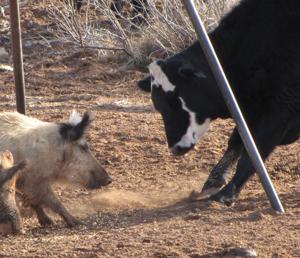
Researchers at Enetwild, a project funded by the European Food Safety Authority, wrote in 2018 that getting accurate counts of wild boar is only feasible in small habitats, in part because the traditional methods of counting animal populations — direct observation — is difficult with nocturnal animals, like wild pigs.
The USDA Animal and Plant Health Inspection Service estimates that feral hogs cause up to $2.5 billion in damages nationwide per year. The animals consume crops, destroy fencing, transmit diseases and parasites and contaminate bodies of water by wallowing and defecating.
Feral hogs are capable of contracting and spreading all of the diseases of domestic swine, including African swine fever, influenza viruses and pseudorabies.
Once feral pigs take over a territory, it’s nearly impossible to eradicate them, said Eric Nelson, wildlife damage program supervisor at the Minnesota Department of Natural Resources.
Feral pigs are intelligent, adaptable, eat a wide variety of foods and have no natural predators besides humans.
“We have a lot to lose if we get feral swine established here,” Nelson said.
Swine are not native to North America. European settlers brought the first pigs to the continent in the 1500s. Later, hunters released Eurasian boars for sport, creating the hybrid population of wild pigs that roam the U.S. today.
Canada didn’t have a significant domestic swine population until the 1980s, according to Ryan Brook, a professor at the University of Saskatchewan College of Agriculture and Bioresources and a leading expert on Canada’s feral hog issue. In order to produce bigger, longer animals, farmers bred domestic pigs with boars to create a hybrid.
“These animals got all the benefits of the wild boar side, especially that fur and the extra long legs and the long snout, and so they got that warmth advantage,” Brook said. “Then they got this huge advantage of being big, which is really important in cold environments to stay warm and survive.”

Leave a Reply